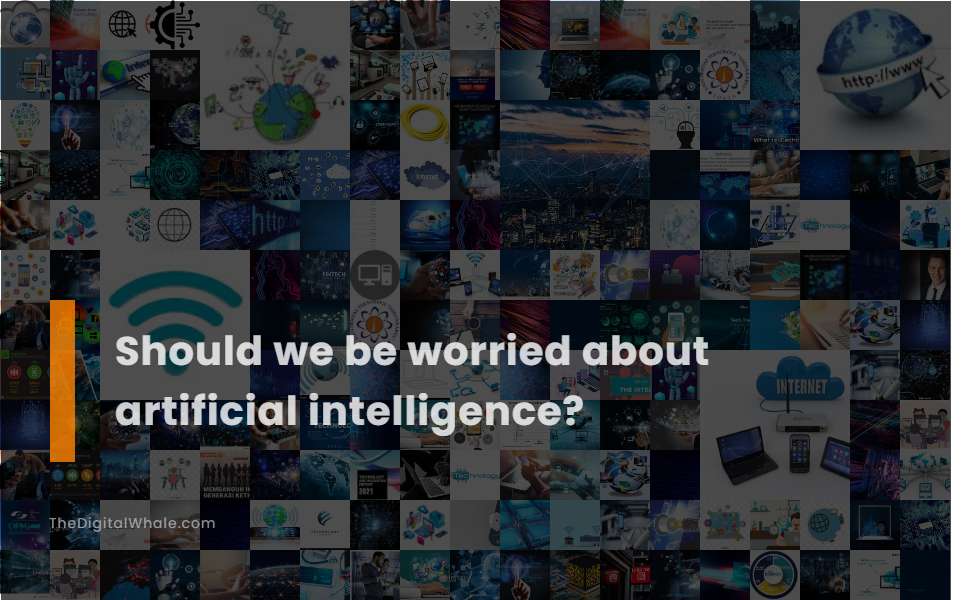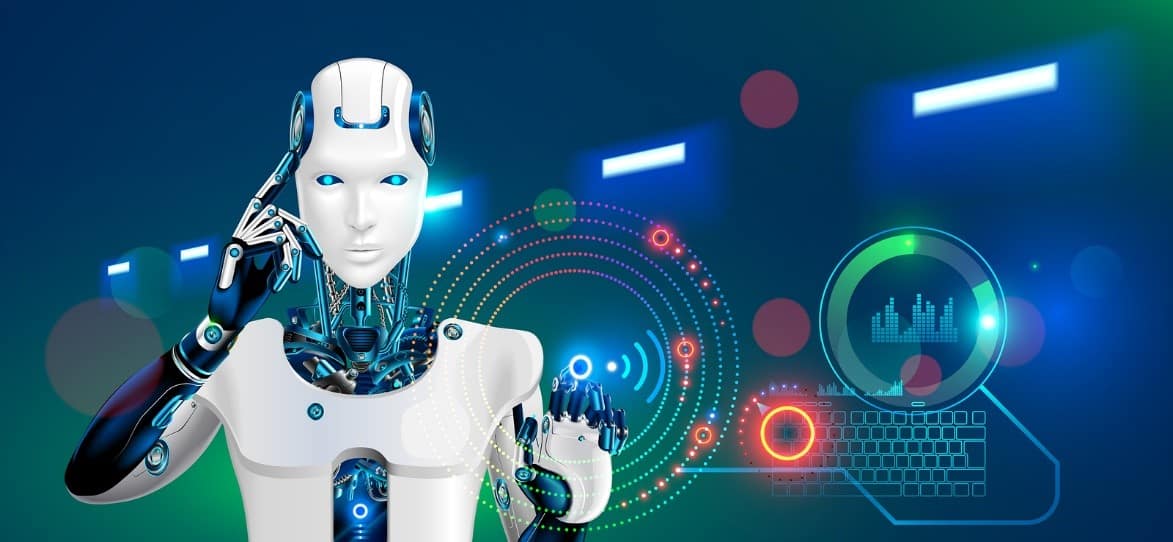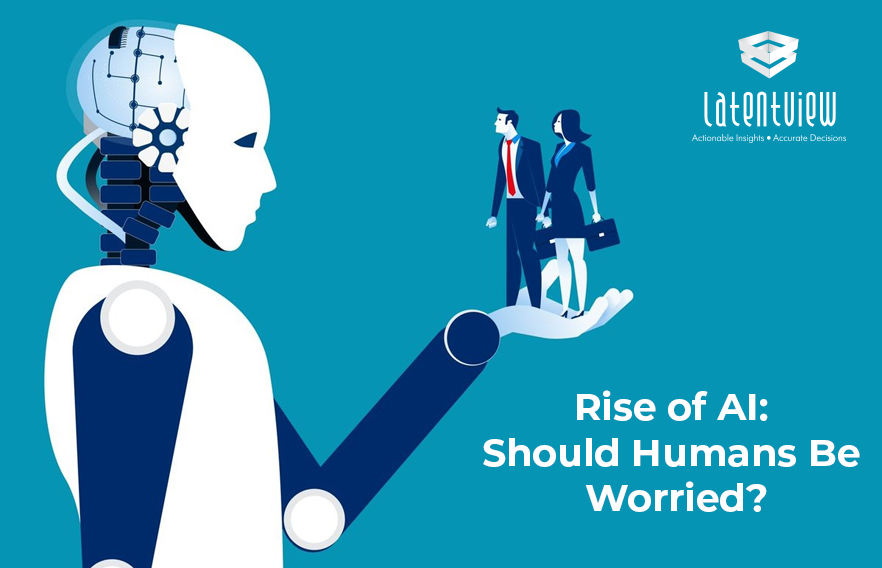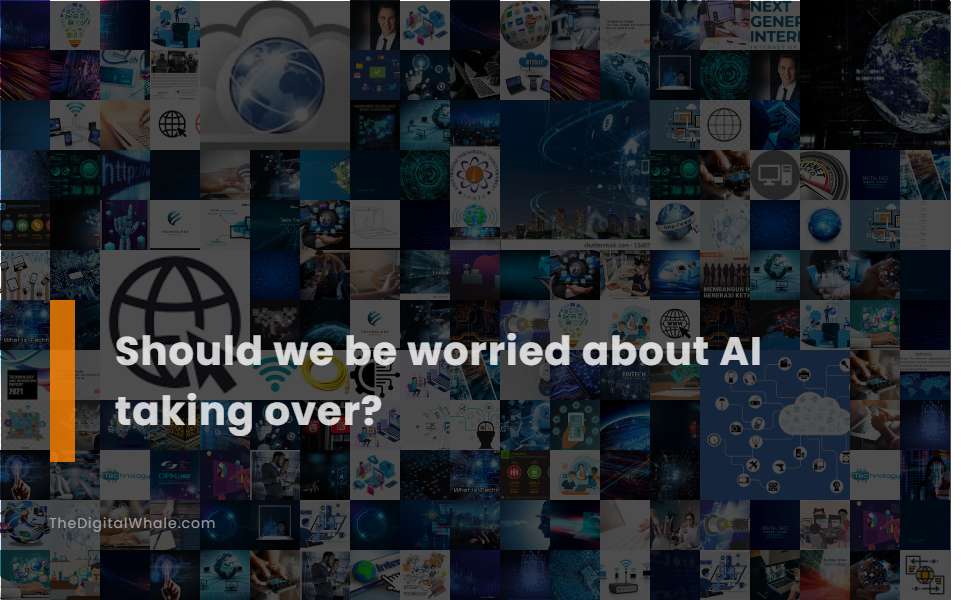Artificial intelligence (AI) is no longer a futuristic concept; it is rapidly permeating our lives, from personalized recommendations on streaming platforms to self-driving cars. This pervasive influence has sparked a critical question: Should we be worried about AI? While AI holds immense potential to revolutionize various industries and solve complex problems, it also presents ethical concerns and potential risks that warrant careful consideration.
This article delves into the multifaceted nature of AI, exploring its potential benefits, examining the concerns surrounding its development and deployment, and analyzing its implications for the future of humanity. We will explore how AI can be a force for good while acknowledging the potential pitfalls that require proactive measures to mitigate.
The Rise of AI

The field of Artificial Intelligence (AI) has witnessed an unprecedented surge in advancements in recent years, transforming numerous industries and aspects of our daily lives. This rapid progress can be attributed to several key breakthroughs, including the availability of massive datasets, advancements in computing power, and the development of new algorithms.
Key Breakthroughs in AI
The rapid advancement of AI is driven by several key breakthroughs:
- Increased Computing Power:The development of powerful processors, such as Graphics Processing Units (GPUs), has significantly accelerated the training and execution of complex AI models. This increased processing power allows for the analysis of vast amounts of data, enabling the development of more sophisticated algorithms.
- Availability of Massive Datasets:The exponential growth of data generated by various sources, including social media, online transactions, and sensor networks, has provided AI researchers with an abundance of information to train and improve AI models. These massive datasets have been instrumental in enhancing the accuracy and performance of AI algorithms.
- Advancements in Algorithms:Researchers have developed new and improved algorithms, such as deep learning, which have significantly enhanced the capabilities of AI systems. Deep learning algorithms, inspired by the structure of the human brain, enable AI models to learn complex patterns and relationships from data, leading to breakthroughs in areas like image recognition, natural language processing, and machine translation.
Impact of AI on Industries
AI is already transforming various industries, impacting the way businesses operate and interact with customers. Here are some examples:
- Healthcare:AI is revolutionizing healthcare by assisting in diagnosis, treatment planning, and drug discovery. AI-powered systems can analyze medical images, identify patterns in patient data, and predict potential health risks. This enables doctors to make more informed decisions and provide personalized care.
- Finance:AI is transforming the financial industry by automating tasks, detecting fraud, and providing personalized financial advice. AI-powered algorithms can analyze market trends, assess creditworthiness, and identify investment opportunities, helping financial institutions to make more informed decisions and manage risk effectively.
- Retail:AI is enhancing the retail experience by providing personalized recommendations, optimizing inventory management, and improving customer service. AI-powered chatbots can answer customer queries, while AI-driven recommendation engines can suggest products based on customer preferences and purchase history.
- Transportation:AI is revolutionizing transportation with the development of self-driving cars, traffic optimization systems, and intelligent logistics networks. AI-powered vehicles can navigate roads autonomously, reducing accidents and improving efficiency, while AI algorithms can optimize traffic flow and manage logistics operations.
Impact of AI on Everyday Life
AI is increasingly impacting our daily lives, from the way we communicate to the way we consume information. Here are some examples:
- Smart Assistants:Virtual assistants like Siri, Alexa, and Google Assistant leverage AI to understand our voice commands and provide personalized responses, from setting reminders to playing music. These assistants are becoming increasingly sophisticated, learning our preferences and providing more contextualized responses.
- Social Media:AI algorithms power the personalized content recommendations we see on social media platforms. These algorithms analyze our interactions, preferences, and network to suggest relevant posts, videos, and articles. This personalized experience can enhance our engagement with social media, but it can also raise concerns about privacy and the spread of misinformation.
- E-commerce:AI is used in e-commerce platforms to provide personalized recommendations, predict customer behavior, and optimize pricing strategies. AI-powered recommendation engines suggest products based on our browsing history and purchase patterns, while AI algorithms can analyze market trends and adjust prices dynamically.
Potential Benefits of AI
Artificial intelligence (AI) is rapidly transforming various aspects of our lives, and its potential benefits are vast and far-reaching. AI has the capacity to solve complex problems, improve efficiency, and enhance our overall quality of life in numerous domains.
AI in Healthcare
AI can revolutionize healthcare by improving diagnostics, treatment, and patient care. For example, AI-powered algorithms can analyze medical images, such as X-rays and MRIs, to detect abnormalities that may be missed by human eyes. This can lead to earlier diagnoses and more effective treatment plans.
AI can also assist in drug discovery and development by analyzing vast amounts of data to identify potential drug candidates and predict their efficacy. Furthermore, AI-powered chatbots and virtual assistants can provide personalized health information and support to patients, improving their overall well-being.
AI in Climate Change
AI can play a crucial role in mitigating climate change by optimizing energy consumption, improving resource management, and developing sustainable solutions. For instance, AI algorithms can analyze data from weather patterns, energy grids, and transportation systems to optimize energy distribution and reduce carbon emissions.
AI can also help in developing renewable energy sources, such as solar and wind power, by predicting weather patterns and optimizing energy production. Additionally, AI can assist in monitoring deforestation and pollution levels, providing valuable insights for environmental conservation efforts.
AI in Education
AI can personalize learning experiences, enhance accessibility, and improve educational outcomes. AI-powered tutoring systems can provide individualized instruction based on each student’s learning style and pace. This can help students learn at their own pace and achieve better academic results.
AI can also analyze student performance data to identify areas where they need extra support, allowing teachers to tailor their instruction accordingly. Furthermore, AI can provide access to educational resources and opportunities for students in remote areas, bridging the digital divide and promoting inclusivity.
AI in Efficiency and Productivity
AI can automate repetitive tasks, optimize processes, and improve efficiency in various industries. For example, AI-powered robots can perform tasks in manufacturing and logistics, reducing labor costs and increasing productivity. AI algorithms can also analyze data to optimize supply chains, inventory management, and customer service operations.
This can lead to significant cost savings and improved customer satisfaction.
Hypothetical Scenario
Imagine a scenario where AI is used to improve traffic flow in a major city. AI-powered traffic management systems can analyze real-time traffic data, such as vehicle location, speed, and congestion levels, to optimize traffic signal timing and route guidance.
This can reduce congestion, shorten commute times, and minimize fuel consumption, resulting in significant economic and environmental benefits.
Concerns Regarding AI
While the potential benefits of AI are vast, it’s crucial to acknowledge and address the concerns surrounding its development and deployment. These concerns encompass ethical dilemmas, potential economic disruptions, and the challenge of ensuring fairness and accountability in AI systems.
Ethical Concerns
The rapid advancement of AI raises profound ethical questions that require careful consideration. AI systems, particularly those based on machine learning, learn from the data they are trained on. This can lead to biases being encoded into the systems, reflecting and potentially amplifying existing societal prejudices.
For example, facial recognition systems have been shown to be less accurate in identifying individuals with darker skin tones, raising concerns about potential misuse in law enforcement and other areas. Moreover, the increasing autonomy of AI systems raises questions about responsibility and accountability.
Who is responsible when an AI system makes a decision that results in harm? These ethical dilemmas require ongoing dialogue and the development of robust frameworks to guide the responsible development and deployment of AI.
Job Displacement and Economic Inequality
One of the most significant concerns regarding AI is its potential impact on employment. As AI systems become increasingly capable of automating tasks previously performed by humans, there is a risk of widespread job displacement across various industries. While AI is also creating new jobs, there is a concern that these new jobs may require skills that are not readily accessible to those who have lost their jobs due to automation.
This could lead to increased economic inequality and social unrest. It is crucial to invest in education and training programs to help workers adapt to the changing job market and ensure a smooth transition to a future where AI plays a significant role in the economy.
Fairness, Bias, and Accountability
Ensuring that AI systems are fair, unbiased, and accountable is essential for their ethical and responsible deployment. AI systems are trained on data, and if this data reflects existing societal biases, these biases can be encoded into the systems, leading to discriminatory outcomes.
For example, an AI system used for loan applications might unfairly discriminate against individuals from certain racial or ethnic groups if the training data reflects historical biases in lending practices. It is essential to develop methods for detecting and mitigating bias in AI systems, as well as mechanisms for ensuring accountability when these systems make decisions that have a significant impact on individuals or society.
AI and Job Security

The advent of artificial intelligence (AI) has sparked widespread discussions about its potential impact on the future of work. While AI promises to automate tasks and improve efficiency, it also raises concerns about job displacement. The interplay between AI and job security is a complex issue that requires careful consideration.
Job Losses and Creation
The potential for AI to automate tasks has led to concerns about job losses across various sectors. However, AI also has the potential to create new jobs and transform existing ones. The overall impact on employment will depend on several factors, including the pace of technological advancement, government policies, and the ability of workers to adapt to new skills demands.
AI is likely to automate routine tasks, while creating opportunities in areas requiring creativity, critical thinking, and complex problem-solving.
Skills and Training for the Future Workforce
To thrive in an AI-driven workforce, individuals need to develop skills that complement AI capabilities. These skills include:
- Critical thinking and problem-solving: AI can help analyze data and provide insights, but it requires human judgment to interpret the information and make decisions.
- Creativity and innovation: AI is good at automating existing tasks, but it struggles with tasks that require originality and out-of-the-box thinking.
- Communication and collaboration: AI is not good at interpersonal interactions, so humans will continue to be essential for teamwork, communication, and relationship building.
- Adaptability and lifelong learning: The pace of technological change is accelerating, so individuals need to be able to learn new skills and adapt to evolving job demands.
Impact on Job Roles
The following table Artikels some job roles that are likely to be impacted by AI, along with potential future adaptations:
| Job Role | Potential Impact of AI | Future Adaptations |
|---|---|---|
| Data Entry Clerk | High risk of automation | Transition to data analysis, data visualization, or data management roles |
| Customer Service Representative | Partial automation, with AI handling routine inquiries | Focus on complex customer issues, relationship management, and personalized service |
| Truck Driver | High risk of automation with self-driving trucks | Transition to roles in logistics management, fleet maintenance, or advanced driving technology development |
| Software Developer | Increased demand for AI expertise | Specialization in AI development, AI-assisted software development, or AI ethics and governance |
AI and Privacy

The rapid advancement of AI technology has raised significant concerns regarding the potential impact on individual privacy. The ability of AI systems to collect, analyze, and interpret vast amounts of data presents both opportunities and risks. While AI can be used to personalize experiences and improve services, it also raises concerns about the potential for misuse, particularly in the realm of surveillance and data breaches.
Data Privacy and Security in AI Development
Data privacy and security are fundamental principles that must be upheld in the development and deployment of AI systems. The ethical use of AI requires safeguarding personal data from unauthorized access, use, or disclosure. Ensuring data privacy in an AI-driven world involves implementing robust security measures, adhering to privacy regulations, and promoting transparency in data handling practices.
AI and Human Control

The possibility of AI surpassing human intelligence and control is a complex and multifaceted topic. While AI has the potential to revolutionize various aspects of our lives, it also raises concerns about its potential impact on human autonomy and control.
It’s crucial to consider the implications of advanced AI and establish ethical guidelines and regulations to ensure that AI remains a tool for good.
Ethical Guidelines and Regulations
The development and deployment of AI systems should be guided by ethical principles to ensure responsible use and prevent unintended consequences.
- Transparency and Explainability: AI systems should be transparent and explainable, allowing users to understand how decisions are made and hold developers accountable. This is particularly important in critical applications like healthcare and finance.
- Fairness and Non-discrimination: AI systems should be designed to be fair and unbiased, avoiding discrimination based on race, gender, or other protected characteristics.
- Privacy and Data Security: AI systems should respect user privacy and ensure the secure handling of personal data. Robust data protection measures are essential to prevent misuse and safeguard individual rights.
- Accountability and Oversight: Mechanisms for accountability and oversight should be established to ensure that AI systems are used responsibly and ethically. This includes clear lines of responsibility for developers, users, and regulators.
Ensuring Human Control Over AI Systems
Maintaining human control over AI systems is essential to prevent unintended consequences and ensure that AI serves humanity’s best interests.
- Human-in-the-Loop Systems: Incorporating human oversight and decision-making into AI systems can help ensure that AI decisions align with human values and goals. This can involve human review of AI outputs, the ability to override AI decisions, or collaborative decision-making between humans and AI.
- AI Safety Research: Investing in AI safety research is crucial to develop robust safeguards and mitigation strategies for potential risks associated with advanced AI. This includes research on AI alignment, controllability, and preventing unintended consequences.
- International Cooperation: Collaboration among nations is essential to establish global standards and regulations for AI development and deployment. This can help ensure that AI is used responsibly and ethically on a global scale.
The Future of AI

The future of AI is a subject of both excitement and trepidation. With the rapid pace of technological advancements, it is difficult to predict with certainty what the future holds. However, based on current trends and research, we can speculate on potential advancements and applications of AI in the coming decades.
Potential Advancements and Applications
The future of AI is likely to be characterized by continued advancements in areas such as:
- Increased computational power:As computing power continues to increase, AI algorithms will be able to process and analyze larger and more complex datasets. This will lead to more sophisticated and accurate AI models, capable of solving problems that are currently intractable. For example, advancements in quantum computing could significantly accelerate the development of AI, leading to breakthroughs in areas like drug discovery and materials science.
- Enhanced machine learning:Machine learning algorithms are expected to become more efficient and capable of handling a wider range of tasks. This will enable AI to learn from data in more nuanced and complex ways, leading to more intelligent and adaptable systems. For instance, deep learning techniques, particularly in areas like natural language processing and computer vision, are expected to see significant advancements, leading to more human-like interactions with AI.
- Increased automation:AI is likely to play an increasingly important role in automating tasks across various industries. This could lead to increased productivity and efficiency, but also raise concerns about job displacement. For example, autonomous vehicles could revolutionize transportation, leading to a decrease in the need for human drivers.
- Advancements in robotics:AI is likely to be integrated with robotics, leading to the development of more advanced and capable robots. These robots could be used in a wide range of applications, from manufacturing and healthcare to space exploration and disaster relief. For example, robots equipped with AI could be deployed in dangerous environments, such as nuclear power plants or disaster zones, to perform tasks that are too risky for humans.
- Personalized experiences:AI can be used to create personalized experiences in various domains, such as healthcare, education, and entertainment. AI-powered systems can analyze individual data to tailor recommendations and provide customized services. For example, AI can analyze medical records and genetic data to provide personalized treatment plans for patients.
Challenges and Opportunities
Navigating the future of AI presents both challenges and opportunities.
- Ethical considerations:As AI becomes more powerful and pervasive, it is crucial to address ethical considerations, such as bias, fairness, and accountability. For example, ensuring that AI systems are not used to discriminate against certain groups of people or perpetuate existing societal biases is of paramount importance.
- Job displacement:The automation potential of AI raises concerns about job displacement. It is crucial to develop strategies for managing this transition, such as providing education and training programs to equip workers for new roles in the AI-driven economy.
- Security and privacy:The increasing reliance on AI systems raises concerns about security and privacy. It is important to develop robust security measures to protect AI systems from malicious attacks and ensure that user data is protected. For example, implementing strong encryption and access control mechanisms is crucial to safeguard sensitive information.
- Human control:As AI systems become more complex, it is important to ensure that humans maintain control over these systems. This includes developing mechanisms for transparency and explainability, as well as ensuring that AI systems operate within ethical and legal frameworks.
For example, ensuring that AI systems are designed to be transparent and accountable for their actions is essential for building trust and confidence in their use.
Possible Future World Shaped by AI
Imagine a world where AI is seamlessly integrated into our lives, transforming every aspect of our existence.
“The future is already here
- it’s just not evenly distributed.”
- William Gibson
Imagine self-driving cars navigating roads with incredible efficiency, reducing accidents and traffic congestion. Hospitals utilize AI-powered systems for diagnosis and treatment, leading to more accurate and personalized care. Smart homes adapt to our preferences, adjusting temperature, lighting, and entertainment systems to optimize our comfort.
AI-powered assistants help us with daily tasks, from scheduling appointments to managing finances. Educational systems are personalized, tailoring learning experiences to individual needs and abilities. The possibilities are endless.
Outcome Summary

The future of AI is both exciting and uncertain. It is imperative to approach its development and deployment with a balanced perspective, harnessing its potential while mitigating its risks. By fostering collaboration between technologists, policymakers, and the public, we can ensure that AI serves humanity’s best interests and contributes to a brighter future.
Question & Answer Hub
What is the difference between artificial intelligence (AI) and machine learning (ML)?
Artificial intelligence (AI) is a broad term that encompasses the development of computer systems capable of performing tasks that typically require human intelligence, such as learning, problem-solving, and decision-making. Machine learning (ML) is a subset of AI that focuses on enabling computers to learn from data without explicit programming.
ML algorithms are trained on large datasets to identify patterns and make predictions.
How does AI impact my privacy?
AI systems often rely on vast amounts of personal data for training and operation. This raises concerns about data privacy and security, as there is a potential for misuse or breaches. It is crucial to implement robust data protection measures and ensure transparency in how AI systems collect and utilize personal information.
Is AI going to take over the world?
The idea of AI surpassing human intelligence and taking over the world is a popular theme in science fiction, but it is not a realistic scenario in the foreseeable future. While AI is rapidly advancing, it is still far from achieving human-level intelligence or consciousness.
However, it is essential to develop ethical guidelines and regulations to ensure human control over AI systems and prevent unintended consequences.
